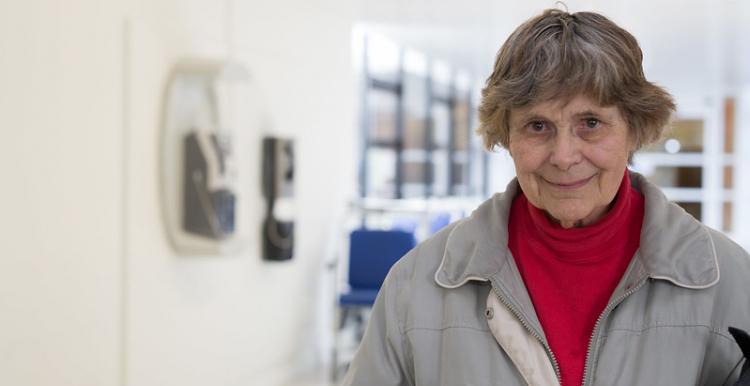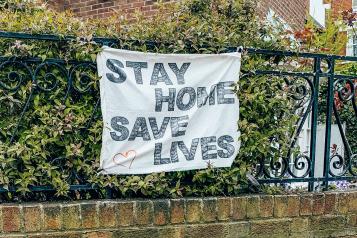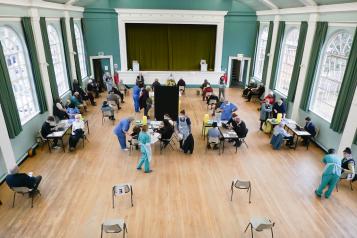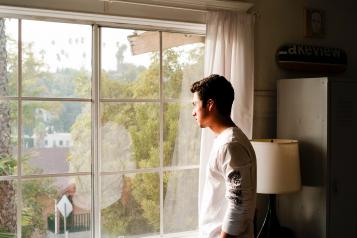What's the difference between social distancing, self-isolation and shielding?

Last updated on 27 July 2021
To help stop the spread of coronavirus, the government is still advising everyone to work from home where they can. To check the latest Government guidance please visit Gov.uk.
What is social distancing?
Social distancing refers to limiting face-to-face contact with others as much as possible.
To protect yourself and others, when you leave home you must:
- wash hands - keep washing your hands regularly and for 20 seconds
- cover face - wear a face covering over your nose and mouth in enclosed spaces
- make space - stay two meters apart from people you do not live with where possible, or one meter with extra precautions (such as wearing face coverings or increasing ventilation indoors)
If you feel unwell and have symptoms of Covid-19 you should self-isolate.
Read more on what you can and cannot do.
Should I be social distancing?
Yes, everyone should be social distancing from anyone not in your household or support bubble until the Government advises otherwise. You should also try to maintain social distancing if providing informal childcare within a childcare bubble.
What is self-isolation?
Self-isolation is the most effective way to prevent the spread of coronavirus and should be done if you show symptoms of coronavirus including:
- a new continuous cough
- a high temperature
- A loss of, or change in, your normal sense of taste or smell (anosmia)
If you display any of the symptoms outlined above you must self-isolate at home for at least ten days from when your symptoms started and order a test and wait for your result.
Consider alerting the people that you have had close contact with in the last 48 hours to let them know you have symptoms of Covid-19.
Following a positive test result, you will receive a request by text, email or phone to log into the NHS Test and Trace service website and provide information about recent close contacts.
You and the rest of your household, even those that aren’t displaying symptoms, must self-isolate and avoid contact with others. This includes stopping day-to-day activities, such as shopping for food or collecting medication.
If you are self-isolating it is a good idea to call on the help of family and friends to help you do tasks where you would need to go outside. If you do not have a close network nearby, contact your local authority or mutual aid groups for help.
Should I be in self-isolation?
The Government's advice is to self-isolate if:
-
you have Covid-19 symptoms, or if you have received a positive test result
-
you have symptoms that may be caused by Covid-19 but are waiting are waiting for a test result, or if you have not been tested and do not require hospital treatment, you must remain at home you are well
-
someone you live with or someone in your support bubble shows symptoms that may be caused by Covid-19
-
you've been told you've been in contact with someone who tested positive.
If you need to self-isolate you should do so for ten days.
What is shielding?
People who are defined as clinically extremely vulnerable are at very high risk of severe illness from Covid-19. People who fall into this category will have previously been advised to ‘shield’.
You can shield yourself following the Government guidance, and shield others by minimising all interaction between yourself and those who are most at risk.
Should I be shielding?
If you have been advised that you are clinically extremely vulnerable this will be because:
- you have one or more conditions that put you at risk of serious illness if you catch Covid-19, or
- your clinician or GP has added you to the Shielded Patient List because, based on their clinical judgement, they deem to you be at higher risk.
If you are in this group, you will have received a letter from the NHS or from your GP telling you this. You may have been advised to shield in the past.
What has changed?
Although the advice to shield has ended, clinically extremely vulnerable people must continue to follow the rules that are in place for everyone. The Government is advising that clinically extremely vulnerable people continue to take extra precautions to protect themselves.
- Vaccination - Everyone on the Shielded Patient List should have already been offered a Covid-19 vaccine. If you have not yet received your first dose, get in touch with your GP or book your vaccine online.
- Socialising - Until the social distancing rules are eased more widely, you must continue to keep the number of social interactions that you have low and try to reduce the amount of time you spend in places where you cannot maintain social distancing.
- Working - Everyone is advised to continue to work from home where possible, but if you cannot work from home you are no longer advised against attending your workplace. Your employer is required to take steps to reduce the risk of exposure to Covid-19 in the workplace and should be able to explain to you the measures they have put in place to keep you safe at work. Furlough has been extended until 30 September as has the Self-Employment Income Support Scheme. You may continue to be eligible throughout this period.
- Education - Clinically extremely vulnerable pupils and students should return to their school or other educational settings.


